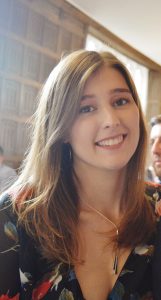Sarah graduated from the School in 2014, and has just finished her first year in the Civil Service Fast Stream programme.
 What attracted you to study at Kent?
What attracted you to study at Kent?
I had not visited the University of Kent prior to putting my options down on the UCAS form. I had flicked through the prospectus and likes the look of the course structure and the variety of modules on offer. At the time, I was unsure which areas of history I wanted to focus on and felt the course presented an opportunity to study a wide range of historical topics.
How did you find your course?
The course was fantastic.
I had a lot of control over the topics I studied and was able to take classes in subjects ranging from 20th Century Science and Literature to Archaic Greece and Persia. The autonomy I had over what I studied allowed me to explore my interests and ultimately led to me continuing my studies on a Masters course.
What did you think of the teaching?
I thought the teaching at Kent was great. I was lucky to take classes taught by some really inspirational lecturers who have certainly influenced me in a positive way.
What did you think of the facilities on campus?
The facilities on campus were good, and I understand they’re even better now with the new library!
What did you think of the level of support available to you?
The level of support from the School of History was great, but it is up to the individual to guide their own learning, through module choices, and to make the most of the experiences and opportunities afforded to them.
Did you take on any work experience placements during your studies? If so, what support did you receive from the School in securing/completing this?
During third year, I volunteered for one day a week at the Canterbury Cathedral Archives. I organised the placement myself, and found it an extremely rewarding and interesting experience. Aside from writing reports and dealing with enquiries, I was also able to help out at specific events. A particular highlight was accompanying a choir school 50th reunion group on a tour of Bell Harry Tower and listening to them sing while standing on the roof!
I also volunteered at the Canterbury Archaeological Society cleaning finds from various local sites – including a Roman pelvis, and the Crofton Roman Villa in Orpington, delivering tours and school workshops.
I was able to organise these placements myself, but the structure of the History course allowed me to undertake these volunteer placements alongside my studies.
How do you think your studies have helped your career prospects?
Throughout my studies I developed a variety of transferable skills that help me every day in my job, such as writing skills and presentation style.
Most importantly, the course taught me that I was in control of my learning experience and making the most of my time and opportunities was down to me. On a course that has limited contact time, it was down to me to manage my time, and it really emphasised to me that you get out what you put in. I have carried this forward into my working life, and it has enabled me to make the most of all my experiences.
What are you doing now?
I have just completed my first year on the Civil Service Fast Stream and am currently working at Her Majesty’s Prison and Probation Service. I am on the HR scheme and am currently undertaking a Postgraduate Diploma in Human Resource Management as part of the programme.
What are your future career plans?
I am taking quite an open approach to my future career. I am looking to finish the Fast Stream and remain within the Civil Service. I like the thought of working for the Department for Digital, Culture, Media and Sport (DDCMS) in a role working with museums as a connection to my academic background and passion.
What advice would you give to anyone thinking of studying History at Kent?
Go for it! The university has such a diverse range of opportunities on offer and the city is a fantastic place to study History.